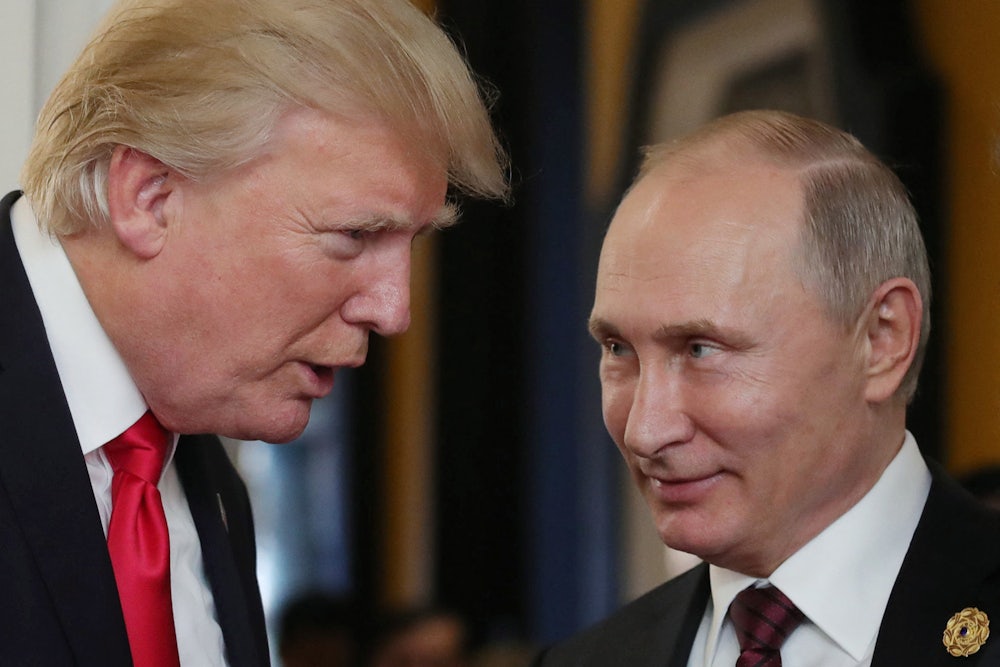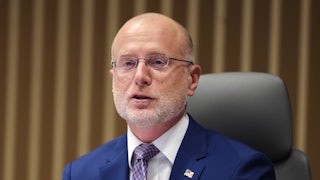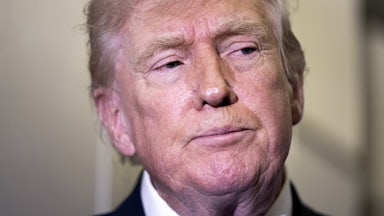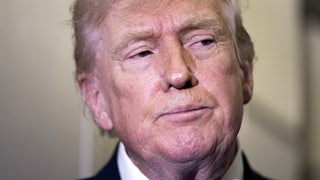As Donald Trump insisted this week that Ukrainian President Volodymyr Zelenskiy was somehow responsible for his own country being invaded by Russia, and accused him of being a “dictator” responsible for “millions” of unnecessary deaths, even Vladimir Putin likely couldn’t believe what he was hearing. For three years, the Russian leader—who, unlike the democratically elected Zelenskiy, is an actual dictator—has been spouting similar disinformation to justify his invasion of a sovereign nation. Putin also has held stubbornly to his wild demands, despite the war having long been mired in a stalemate.
Now, improbably, Putin is poised to get everything he wants—huge territorial gains, the crippling of Ukrainian democracy, a weakened NATO—for no reason other than that Trump was elected as part of a global backlash to rising prices. It’s shocking that any American president would effectively abandon its defense of a former Soviet state in favor of Russia, but it’s also unsurprising that Trump, specifically, would do so. He has long made it obvious that he sees no value in sticking up for a small democracy against a larger dictatorship. And yet his negotiations with Russia over ending the war in Ukraine are still breathtaking in their cynicism and inhumanity. In his haste to end the war and give himself the bogus title of “peacemaker,” Trump is acceding to every Russian demand and setting Europe, and perhaps the world, up for even more devastation to come—without getting anything in return for the United States.
One of the hallmarks of Trump’s style of governance is that he cares little about most aspects of foreign policy. But he does appear to have genuinely swallowed the entire Russian propaganda narrative about Ukraine, short of repeating Putin’s nonsensical pretext that Ukraine needed to be “de-nazified.” While Trump is unmoved by the actual stakes of the war—an emboldened Russia that may look to invade other neighbors, particularly Poland and the Baltic states, that belong to NATO—he does adore strongmen. At the same time, he also is so desperate for a huge, legacy-defining “win” that he is eagerly giving Russia everything it wants, even going so far as to make concessions to Putin before negotiations have begun in earnest.
Trump’s foreign policy is typically described as “isolationist,” but that’s not quite accurate. He’s a transactional imperialist. He sees the war in Ukraine as being useless because it costs America billions but only provides ineffable benefits (like checking Russian belligerence). The talks that Secretary of State Marco Rubio is currently engaging in with his Russian counterpart, Sergei Lavrov, are instructive insofar as they show a different set of priorities. Trump wants the war to end, but he also wants to rob Ukraine of much of its sizable deposits of natural resources and precious metals, ostensibly to pay America back for the money it spent in helping Ukraine defend itself.
What Trump is asking for—from a nation that the United States was, until recently, pledged to defend—is so breathtaking it is difficult to comprehend. Ukraine not only would cede a great deal of its sovereign territory to Russia, it would also effectively cede much of its economy to the U.S.—all to “pay it back” for its support in a war that Trump is now attempting to force it to surrender. Per The Telegraph, the U.S. would take half of Ukraine’s revenues from resource extraction as well as half of the financial value of “all new licenses issued to third parties” for the monetization of those resources. The U.S., moreover, would have to be paid before anyone in Ukraine saw a dime. It makes the terms imposed on Germany at the end of World War I seem downright modest. At the same time, it would effectively destroy what remains of America’s reputation abroad. Why would any nation accept American support knowing that a future administration could waltz in and demand such onerous terms?
Trump is perfectly happy to be involved abroad, in other words, as long as the U.S. is getting some material benefit from it. Recall his take on the Iraq War, which in his mind was a folly not because it inflamed tensions in the Middle East and accomplished none of its goals in spreading democracy, but because the U.S. didn’t “take the oil” as part of its invasion. Or his vow, as president in 2019, that the U.S. is “ keeping the oil” in Syria. (To this day, U.S. troops are illegally occupying oil fields there.)
Trump’s retreat from Ukraine should be seen as part of a larger recalibration of the United States’ strategic focus, at least for the next four years. Doing the kind of things that the U.S. did after World War II—advancing democracy, investing in alliances, countering dictatorships and adversaries—are all out. Part of this means a retreat from the nation’s European allies, whom Trump consistently denigrates as freeloaders who should provide their own security. “This War is far more important to Europe than it is to us,” Trump wrote Wednesday on Truth Social. “We have a big, beautiful Ocean as separation.”
Instead, Trump is reorienting U.S. foreign policy toward antagonizing allies, and even shaking them down. Trump sees all interactions in zero-sum terms, including diplomatic relations; there are only winners and losers, and he believes that the United States is being taken advantage of by capricious, greedy, and weak nations who are allies in name only. Thus, he has taken aim at Canada (which he insists will become the “51st state”), Europe (particularly Denmark, from whom he wants to acquire Greenland—the “52nd state”), and much of Latin America, which his administration is fixated on exerting its influence over.
Trump has initiated trade wars with some of these countries. Relations with Canada, in particular, are perhaps lower than they have been since the War of 1812. The tariffs Trump has levied against America’s neighbors always have stated rationales (usually stopping the flow of illegal drugs or migrants), but in every case it’s clear that there is little that any country can do to meet these vague demands. Trump’s tariffs are partly guided by his increased veneration of William McKinley, who used them over a century ago—in a vastly different world—to enrich the nation. But they are also textbook examples of bullying: There is no ultimate goal, other than to show one’s dominance.
This points to what unites Trump’s foreign policy both in the Americas and in Ukraine. He worships “strength” and wants no part in pitting the United States against another Great Power—even a weakened one, like Russia. Instead, he’s prowling around the schoolyard, looking for smaller nations that he can pick on. The result is not just an embarrassment for the entire nation, but a massive exercise in futility. Trump’s foreign policy will do nothing good for the United States, even as it is already accomplishing a great deal for our adversaries.






